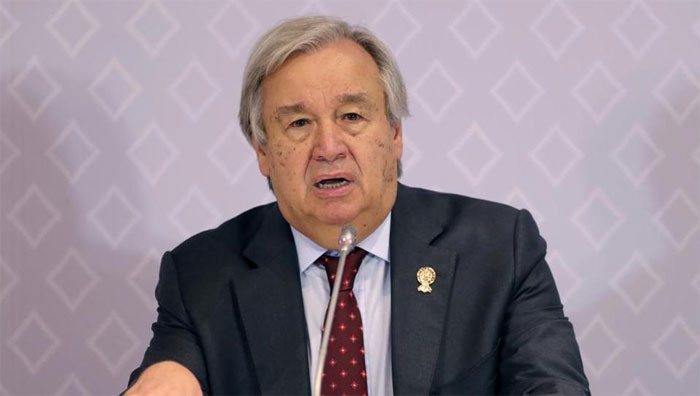BANGKOK: Describing climate change as the biggest threat to sustainability, UN Secretary General Antonio Guterres has expressed serious concern over the rising level of oceans and said the most vulnerable areas are in Japan, China, Bangladesh and India.
Guterres, speaking to reporters in Bangkok where he is attending the ASEAN Summit, said the biggest threat to sustainability today in the world is climate change. He cited a recent report by a research center that said the level of the oceans is rising much faster than what was forecasted because of climate change.
The UN Chief stressed that unless nations are able to reverse this trend, because climate change for the moment is running faster than actions being taken by governments, the research forecasted that 300 million people will be flooded by sea water in the world by 2050.
“Dramatically, the most vulnerable areas are exactly in Southeast Asia, in Japan, China, Bangladesh and India,” he said adding that Thailand risks to have 10 per cent of its population in flooded areas by the sea. The recent study by non-profit organisation Climate Central was published in the journal Nature Communications. Guterres emphasised that people can discuss the accuracy of these figures, but it is clear that climate change is “running faster than what we are and is the biggest threat to the planet at the present moment, the defining issue of our time”.
He said the UN is deeply committed to raise attention to governments, business community, civil society, local authorities to the needs to abide by what scientists are telling the world that there is urgent need to contain the rising temperatures 1.5 degrees until the end of the century. “And for that to be possible, we need to be carbon neutral in 2050 and reduce the emissions by 45% in the next decade.”
The UN chief underscored that to achieve this there is need for lot of political commitments, saying nations have to put a price on carbon. “We need to stop subsidies for fossil fuels. And we need to stop the creation of new power plants based on coal in the future.
And this question is particularly sensitive in this part of the world because there is still a meaningful number of new coal power plants for electricity production that is foreseen in the future in East Asia, in Southeast Asia and in South Asia.” Guterres said there is an “addiction” to coal that nations need to overcome because it remains a major threat in relation to climate change.
Those nations that are in one of the most vulnerable areas to climate change need to lead by example and be in the front line of carbon pricing, of stopping subsidies to fossil fuels and of stopping the construction of coal power electricity plants in order to be able to defeat climate change, he said.
(PTI)









Comment